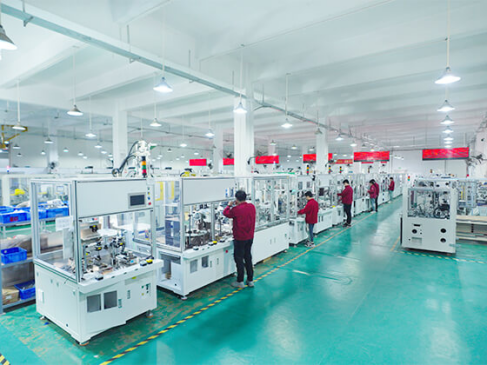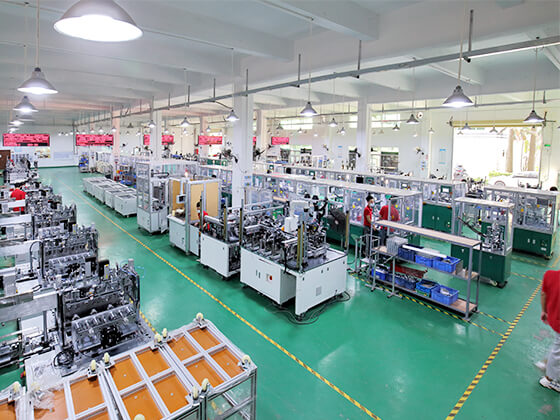In a world where manufacturing demands are shifting toward customization, faster delivery, and leaner operations, traditional manual and semi-automated systems are quickly becoming obsolete. The solution? Automatic assembly lines combine precision engineering, real-time data, and intelligent control systems to unlock scalable, high-efficiency manufacturing.
This article explores how automatic assembly lines, automatic production lines, and automated assembly lines are redefining the future of modern manufacturing—and why forward-thinking engineers are leading the charge.

1. Understanding the Terminology: Not Just Buzzwords
Though often used interchangeably, these terms have subtle distinctions that shape how automation is implemented:
Automatic Production Line
Refers to an end-to-end line where all manufacturing processes—machining, handling, inspection, packaging—are automated. It's commonly used in mass production environments.
Automatic Assembly Line
Focuses on the automated joining of components into finished products or subassemblies. These lines include robotic arms, precision fixtures, and automated screwdriving, gluing, or welding units.
Automated Assembly Line
Emphasizes smart integration—combining sensors, AI-driven control, real-time diagnostics, and system adaptability. These lines often represent Industry 4.0-ready infrastructure.
Key takeaway: All three work toward the same goal—productivity, consistency, and scalability—but differ in scope and sophistication.
2. The Core Components of an Automatic Assembly Line
A high-performing automated system doesn’t rely on automation alone—it’s built on a synergy of precise hardware and intelligent software:
(1) Feeding and Loading Systems
Vibratory feeders, robotic pick-and-place arms, and AGVs (Automated Guided Vehicles) streamline material handling with minimal human input.
(2) Assembly Modules
Dedicated units for operations like pressing, gluing, welding, screwing, or inserting parts. Often modular and reconfigurable.
(3) Inspection & Testing Systems
Inline vision systems, torque sensors, and electrical testing ensure 100% quality control.
(4) Control Systems
PLCs (Programmable Logic Controllers), SCADA (Supervisory Control and Data Acquisition), and HMI (Human Machine Interfaces) allow centralized control and monitoring.
(5) Traceability & Data Systems
Barcode/QR tracking, real-time data collection, and MES/ERP integration for total visibility and traceability.
3. Why Engineers Choose Automatic Assembly Lines
Increased Efficiency
Automation reduces cycle time, eliminates manual bottlenecks, and allows continuous 24/7 operation.
Consistent Quality
Precision-controlled processes ensure that every unit meets exact specifications, reducing defect rates and rework.
Scalability
With modular architecture, capacity can be increased or adjusted with minimal downtime.
Cost Savings
Although the upfront investment is higher, ROI is quickly realized through labor savings, reduced errors, and longer uptime.
Data-Driven Manufacturing
Automatic lines offer live data streams, enabling predictive maintenance, process optimization, and faster decision-making.
4. Industry Applications: Where Automatic Lines Make the Difference
Automatic assembly and production lines are transforming industries with complex products or tight quality requirements:
|
Industry
|
Application
|
|
Automotive
|
Stator and rotor motor assembly (EPS, oil pump, drive motor, ABS)
|
|
Home Appliance
|
Fan motors, compressors, small motor subassemblies
|
|
Consumer Electronics
|
Precision modules for smartphones, wearables, IoT
|
|
Medical Devices
|
Syringes, infusion pumps, diagnostic device modules
|
|
Energy Storage
|
Battery modules, pack lines, power electronics
|
In each case, automation brings higher throughput, consistent quality, and faster response to market demand.
5. HONEST Case Study: From Concept to Mass Production
At HONEST Automation, we design and deploy custom-built automatic assembly lines tailored to complex motor and actuator systems. One of our flagship projects involved an EV motor production line where the client needed to switch between 4 types of stators.
Solution Highlights:
Modular assembly stations with automatic tooling change
Dual-lane production with real-time part recognition
Integrated MES with traceability and data analytics
Automated quality inspection with smart vision
Results:
Changeover time reduced from 3 hours to 20 minutes
25% increase in overall line efficiency
99.2% first-pass yield
50% reduction in manual labor
This illustrates how automated assembly lines are not just efficient but scalable, flexible, and intelligent.
6. The Smart Future: Trends in Automated Manufacturing
As digital transformation accelerates, the future of automated assembly will be defined by:
Flexibility
One line, many products—thanks to modular design and programmable logic.
Connected Systems
Cloud-based MES and AI diagnostics will drive autonomous process improvements.
AI & Machine Learning
From predictive maintenance to quality prediction, intelligent algorithms will refine performance.
Digital Twins
Simulated production environments will reduce commissioning time and enable faster iteration.

7. Automation Is Not Optional—It’s Strategic
In the age of mass customization and smart factories, automatic assembly lines are not just machines—they are strategic assets. Engineers, plant managers, and OEMs must embrace automation not just for speed, but for agility, accuracy, and intelligence.
With the right partner, you can transform your production line into a future-ready, fully integrated manufacturing platform.
Ready to Build Your Automatic Assembly Line?
At HONEST Automation, we help global manufacturers build customized, high-efficiency assembly and production lines tailored to their exact needs—from EV motors and humanoid robot actuators to smart home and medical devices.
Let’s turn your automation goals into engineered reality.
Contact us today to explore your automatic assembly solution.





